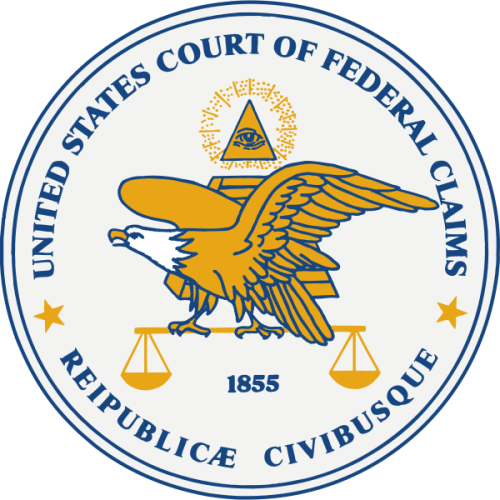
Kathryn Davis may only be 42, but her time with the Federal Programs Branch has involved her in some very significant cases.
Background
Born Kathryn Celia Mason in Miami in 1978, Davis received a B.S. from Boston University and a J.D. from Temple University Beasley School of Law.[1] After graduation, Davis joined McKissock & Hoffman P.C. in Philadelphia as an associate.[2]
After two years at McKissock and a year at Burns White LLC, Davis moved to Washington D.C. to become a trial attorney with the Federal Programs Branch of the Civil Division of the U.S. Department of Justice. Since 2014, Davis serves as a Senior Counsel in that Branch.[3]
Additionally, Davis has been a Professor at the George Washington University School of Law since 2018, where she teaches Legal Research and Writing.[4]
History of the Seat
Davis has been nominated for a seat on the U.S. Court of Federal Claims (CFC), an Article I court that hears monetary claims against the federal government. Judges to the CFC are appointed for 15-year terms, and can be reappointed. The seat Davis was nominated for opened up on July 13, 2018, with the conclusion of the term of Judge Charles Lettow.
In February 2018, Davis was contacted by the White House regarding a vacancy on the CFC. While she was interviewed in February 2018, she wasn’t selected as a nominee at the time.[5] In June 2019, Davis was contacted again by the White House, and, this time, her nomination moved forward. Davis was ultimately nominated on February 4, 2020.
Legal Experience
As an attorney with the Federal Programs Branch, Davis litigates cases across the country that challenge the Administration’s policies and initiatives. To this end, Davis has litigated some very contentious political issues, defending both Obama and Trump Administration policies.
Detention in Guantanamo Bay
Across the Bush, Obama, and Trump Administrations, Davis handled a number of challenges to detention brought by detainees held in the Guantanamo Bay Detention Facility.[6] Notably, Davis defended the government’s policy of force-feeding Guantanamo Bay detainees who were on hunger strikes to protest government policies.[7] Judge Rosemary Collyer sided with Davis’ position and denied an injunction to block the Government policy.[8]
Policy Defense
In addition to her work on Guanatanamo detention cases, Davis has litigated a number of contentious challenges to Administration policies. For example, Davis defended the Administration’s decision to rescind the Deferred Action for Childhood Arrivals (DACA) program.[9] She also defended the Administration’s building of border fencing and barriers against a court challenge brought by the U.S. House of Representatives.[10]
Writings
As a law student, Davis authored a law review article discussing the Supreme Court’s decision in Sattazahn v. Pennsylvania.[11] The article was critical of the 5-4 opinion, which held that the State of Pennsylvania was not barred from seeking the death penalty for a defendant when a previous jury had deadlocked and was unable to decide whether to impose the death penalty.[12] Specifically, Davis argued that the court “failed to safeguard the interests of a defendant who receives a life sentence, as mandated by state law, after a jury deadlocks on the life or death question in a capital sentencing proceeding.”[13]
Additionally, Davis noted the “unique, final nature of the death penalty” which “increases the need for double jeopardy protection” for defendants.[14] Davis notes:
“Disregarding the Double Jeopardy Clause in capital sentencing does not mean just a wrongful conviction; it could mean the wrongful imposition of death.”[15]
Instead, Davis advocates that the Supreme Court hold that the Double Jeopardy Clause bars a state from seeking the death penalty in a subsequent trial where the initial sentencing jury failed to impose the death penalty.[16]
Overall Assessment
Trump’s CFC nominees in particular have drawn criticism for their youth and inexperience. Davis, in contrast, may be young, but also has substantial experience with complex litigation. While Davis may draw some criticism for her role in defending the Trump Administration’s initiatives, it must be noted that she is a career attorney who also played a role in defending the Obama Administration’s priorities as well.
[1] Sen. Comm. on the Judiciary, 116th Cong., Kathryn Davis: Questionnaire for Judicial Nominees 1.
[2] Id. at 2.
[3] Id.
[4] See id. at 22.
[5] See Davis, supra n. 1 at 24.
[6] See, e.g., Al Madhwani v. Obama, No. 04-cv-1194 (D.D.C.) (Hogan, J.); Al-Qahtani v. Bush, No. 05-cv-1971 (D.D.C.) (Collyer, J.); Esmail v. Obama, No. 05-cv-1254 (D.D.C.) (Kennedy, J.); Mingazov v. Obama, No. 05-cv-2479 (D.D.C.) (Kennedy, J.) (Hogan, J.).
[7] Rabbani v. Obama, 76 F. Supp. 3d 21 (D.D.C. 2014).
[8] See id. at 22.
[9] See NAACP v. Trump, 139 S.Ct. 2779 (2019).
[10] See U.S. House of Representatives v. Mnuchin, 379 F. Supp. 3d 8 (D.D.C. 2019).
[11] Kathryn C. Mason, Life Or Limb: The Supreme Court’s Apathy Toward Capital Offenders Sentenced to Life Imprisonment By Operation of Law, 14 Temp. Pol. & Civ. Rts. L. Rev. 307 (Fall 2004).
[12] See Sattazahn v. Pennsylvania, 537 U.S. 101 (2003).
[13] See Mason, supra n. 11 at 320.
[14] See id.
[15] Id.
[16] See id. at 321.